Last night, Leah Martin, a founding board-member of the first-year World Powerboat Racing Association and the point person for the International Hot Rod Association’s recent high-profile entry—a $250,00- purse for the upcoming Key West World Championships certainly meets that criteria—into the currently fractured sport of offshore racing, sent out the following message to some 500 racers:
“As we look ahead to the next era of offshore racing, we want to make one thing very clear—everything is on the table. We’re collecting racer input on series format, race sites, class structure, purse/tow fund, safety/tech, officiating, media/broadcast and overall racer experience.”
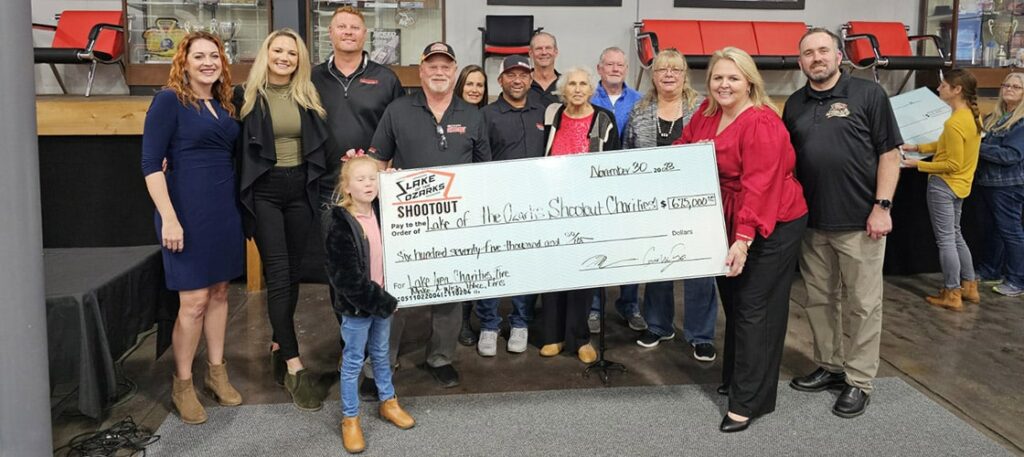
Now an IHRA executive, Leah Martin (at right in red) is the executive director and the founder of the World Powerboat Racing Association.
Her message was well-timed given the newness and unknowns of IHRA involvement and that the first Key West Race is less than weeks away. The Key West Worlds are offshore racing’s biggest stage. All eyes, at least of offshore racers and their fans, will be on it.
But still, despite the open-ears sentiment Martin—a former lobbyist and current executive director of the Lake of the Ozarks Shootout—expressed in her message it raised hard questions. So I reached out and asked some of them.
Here’s what she had to say
Why that particular message to the offshore racing community—and why now?
Why not now? Whether it’s social media, phone calls, texts, or emails everyone has an opinion and whether we agree or not, everyone has the right to feel validated in their beliefs. This gives the opportunity to obtain valuable input from the racer and obtain valuable perspective. The 2026 season planning begin months ago, this is part of that no matter the acronyms.
The inaugural World Powerboat Racing Association season was not without conflict and controversy, especially given that it emerged as an offshore-racing-focused alternative to the American Power Boat Association. And now it appears that the WPRA will be done after its first with the IHRA taking a leadership role. Why should racers trust you and a new group moving forward?
The WPRA was formed to be racer-focused—from day one the goal was to support racers and grow the sport. I don’t think we look at WPRA as a failure, we did a lot with a little time—when we were forced to do so. We have worked for months seeking sponsors and partners to make the sport better, the banner didn’t matter. Coming under the IHRA banner is the next step for WPRA to support racers. Any organization that doesn’t see this is best for the sport is worried about their own acronyms. We aren’t.
Where did the WPRA succeed?
We legally formed a sanctioning body, created rules, structure, and secured insurance within 45 days. That’s a win, no matter how you look at it.
Where did it fail?
The above 45-day run-up didn’t allow for the time needed to truly fine tune the rules. The rules need a lot of work. It’s a top priority.
You must have learned something from both experiences? What is it?
I have learned more about rules, starts, and parts than I ever desired to do so (laughs). Seriously, my biggest take away is whether you’re a racer, promoter, or sanctioning body the current formula doesn’t equal success. There are great ingredients but the recipe in which we have been following isn’t working.
Darryl Cuttell, the owner the IHRA, is a successful businessman and entrepreneur. But he has owned the drag-racing entity for a little less than a year. Clearly, he has deep pockets. His financial resources notwithstanding, why should the offshore racing community put their faith in him?
I asked the same question. We met at the Shootout and briefly spoke about offshore racing. He invited us to the next drag race. I have said it before, but Shootout tired is like no other tired. The absolute last thing I wanted to do was go to a drag race immediately after. I just needed a nap. However, I just had this gut feeling that going was the right thing.
A quick Google gives you information about Darryl, but spending time with someone and seeing how they interact with others says it all. I wanted to see how those around him interacted. Did IHRA employees love their job or were they obviously hating it? How will they respond to the fact that I took three kids to the drag races? It was all this weird space to just feel each other out.
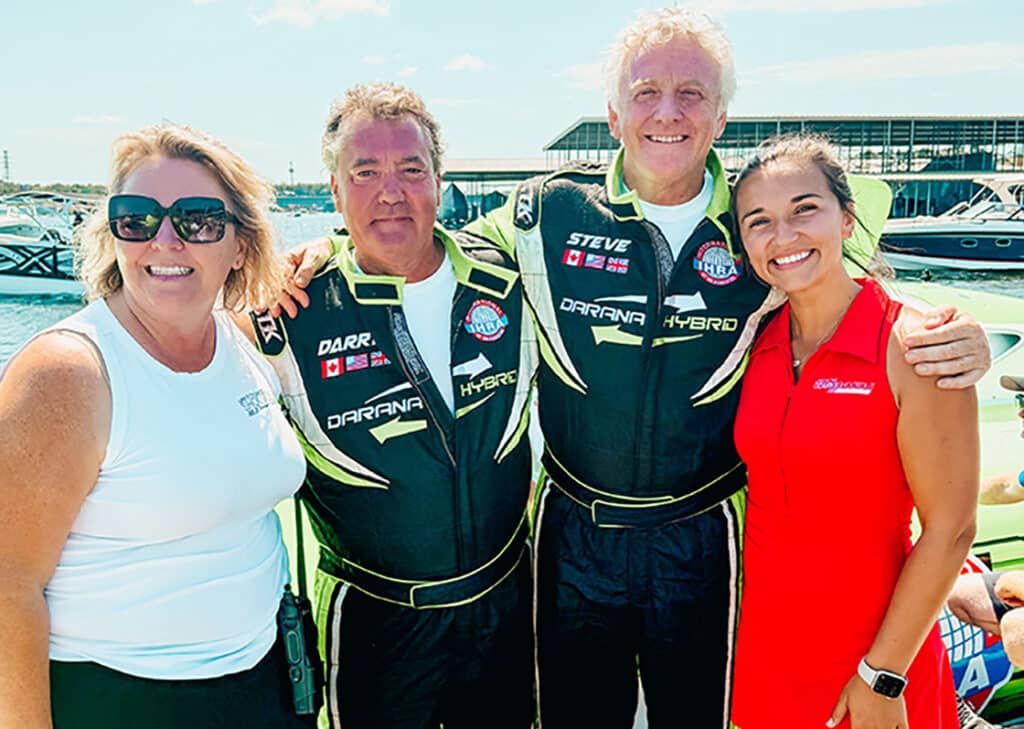
Martin met Cuttell (second from right) for the first time during the Lake of the Ozarks Shootout in late August.
And I have to tell you the weekend couldn’t have gone better. Every employee absolutely loved their job, everyone was so pleasant from the parking attendant to the folks in VIP. It was very evident that they appreciated everything that Darryl did and was doing at the tracks. The racers were happy, he delivered ice to the racers every morning when we were there and held racer dinners. The talking points that he and I discussed all weekend were almost verbatim to everything we said in May at the formation of WPRA.
Darryl has owned the same company for 40 years. He is well-respected. He loves the racing community, and he wants to make offshore great. After visiting the race , he texted me, “What we are going to do for the racers is going to be incredible. They just don’t know it yet”. That’s his heart and it’s evident.
As a publisher who devotes considerable resources to offshore racing coverage, I am particularly curious why you solicited racer input on “media.” Can you clarify that?
Media as in production, meaning television.
Like many offshore racing leaders, you have often used the term “for the good of the sport.” But “good” is subjective and open to interpretation. How do you personally define what is “good” for the sport?
I believe in doing things for the greater good. It would be easy to just do what Leah thinks is right. However, I’m human and make mistakes daily. My pastor’s wife always says “Do the next right thing.” The good of the sport for me is simply that, doing the next right thing at every conversation, at every decision, to add value for fans, racers, sponsors and so on.
You’ve also said that you want to help “unify the sport.” And yet you helped start another organization that led to further fragmentation this season. What went wrong?
For me, it was simply to do with the fact that we had given our word to a class. As promoters or local race sites, you begin negotiations with the different classes in November and December. Which is exactly what happened last season. In early January, Pro Class 1 sent an email requesting each promoter answer questions about race sites. One of those questions asked if we would acknowledge them as pro class one. To which all promoters signed yes.
Fast forward to April 30 when we were told, on an Offshore Racing Commission call, that if we were to acknowledge the 1100 class as anything other than Class One we would lose our sanctioning and insurance. What other choice did we have? Quite frankly, I knew I could get insurance because the Shootout has the same insurance as offshore racing.
My background enables me to understand the formation of organizations. We gave our word months ago and keeping our word matters, whether it’s about the name of a class or proper safety. It matters.
You asked open-ended questions to 500 racers. What sort of responses are you expecting to get?
Hopefully, raw honest truth. It’s time to have hard conversations and look at where we’ve been—a 360-degree evaluation if you may. It’s important to understand their perspective. One of the questions asked about transparency, and leadership. A friend told me to leave that question out. But it’s important to understand how racer’s feel.
Is pleasing everyone possible? And if not, how do you manage what is likely to be some significant disagreement?
Jesus certainly didn’t, so I don’t suspect we will. Pleasing everyone isn’t the goal, ensure that everyone has a voice is the goal. This format offers a productive way to do just that, instead of social media comments that may or may not be heard. We manage conflict with open communication and transparency.
The season was a rough one—at best. Key West is just around the corner. How would you like to see it end, and what can you do as organizer and leader to make it happen?
We hope to end the season with unity and competitive, safe racing. I asked Darryl to sponsor Key West to host racers, love on them and financially support them at Key West. Key IHRA staff will be at Key West branded in IHRA blue. I think some will be surprised of the team we are assembling.
Related stories
Payout Details For $250,000 Purse For Key West Worlds Released
Season-High Five Super V Teams Registered For Key West Worlds
IHRA Purchases Powerboat P1 USA/P1 Offshore
Coverage From The 2025 Key West Offshore World Championships And FPC Powerboat Week


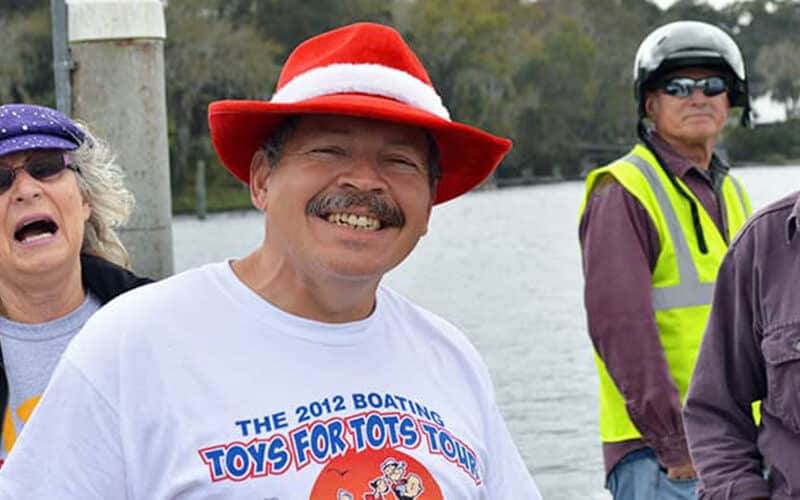
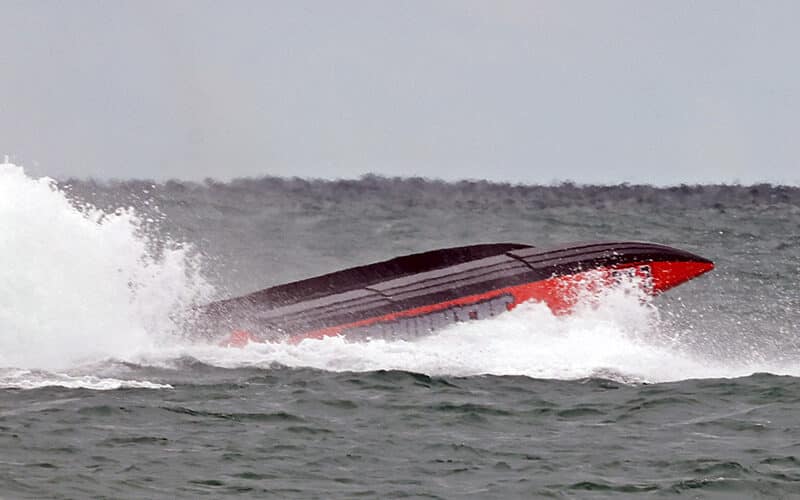
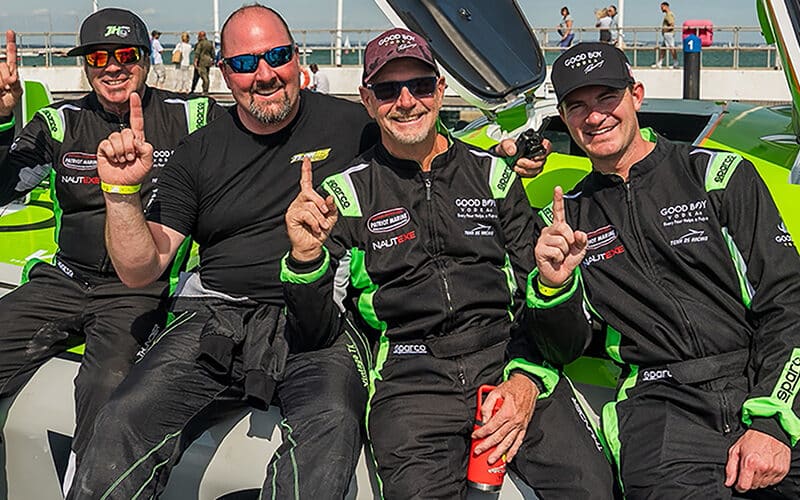

 and then
and then